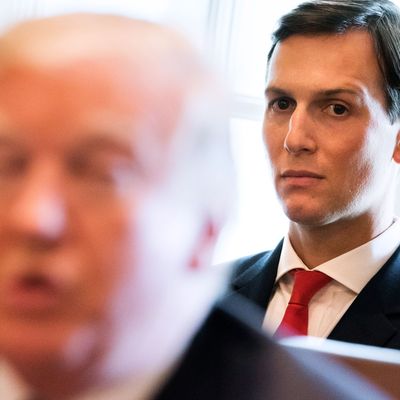
President Trump won the presidency, in part, by focusing (however disingenuously) like a laser on Hillary Clinton’s clumsy handling of classified information. But more than a year into his presidency, Trump employs dozens of people who lack full security clearances, yet have access to some of the nation’s most sensitive secrets.
CNN estimates the number of staffers who still haven’t received clearances at 30 to 40. The White House claims that the plethora of delays is par for the course, but several sources told the outlet that that it is, in fact, highly unusual.
Because of concerns about his past behavior, Rob Porter, the White House staff secretary who resigned this week after two ex-wives alleged that he had physically abused them, was still operating on an interim security clearance when he stepped down. White House counsel Donald McGahn knew about the allegations, but decided not to act as he waited for a “final determination” of Porter’s status, according to the Washington Post.
The most prominent member of the White House staff still waiting for a permanent security clearance is the president’s son-in-law, Senior Adviser Jared Kushner. Given his preternatural shadiness on pretty much all matters, this is not all that surprising. Kushner has had to revise his security-clearance form again and again after neglecting to mention to mention that he met with Russian ambassador Sergey Kislyak, Kremlin lawyer Natalia Veselnitskaya, and many others. His friendship with Chinese-American businesswoman Wendi Deng Murdoch and one-on-one meetings with Chinese Ambassador Cui Tiankai have raised plenty of eyebrows about his vulnerability to an influence campaign. And he’s near the center of Special Counsel Robert Mueller’s investigation into Russian electoral interference. (Democrats have pushed for Kushner’s and Ivanka Trump’s clearances to be revoked, to no avail.)
On Friday, the Post reported that, according to several sources, “White House Counsel Donald McGahn and other Trump administration officials have been so vexed by Jared Kushner’s months-long inability to obtain a permanent security clearance that they have hesitated to get involved in other cases with potential problems.”
This may partially explain the unusually high number of other staffers who are still waiting for their papers to come through, though it’s far from clear how many of the clearance-less staffers have red flags as obvious as Kushner’s and Porter’s.
Another possible reason for the lag is that many White House staffers, serving as they do in a stridently anti-government administration, were imported from the private sector — unlike previous administrations full of old Washington hands who had already been cleared to serve in government.
And then there’s the fact that, even before Trump moved in to the White House, there was an existing crisis in processing security clearances. A recent Government Accountability Office study found that the security-clearance backlog had ballooned from 190,000 cases in August 2014 to more than 709,000 by September 2017.
The FBI initiates a background check, but the White House Office of Presidential Personnel must sign off on clearances for the process to move forward; if they fail to do so, the staffer in question is stuck with an interim clearance. It’s easy to imagine that this ever-disordered administration is at least partly to blame for the lag.
“At the end of the day, if we are going to solve this problem, we are going to have to fix the way we issue clearances, by both getting faster and better at the process of vetting and clearing people, or ultimately denying people clearances and moving them on to other opportunities, but the current challenge cannot go unaddressed for much longer,” a former associate counsel to President George W. Bush, told CNN.
Whether it’s at fault or not, the White House has adopted a typically nonchalant posture about all the delays, seeming to calculate — correctly — that as long as Republicans control all three branches of power, nobody will bother with any kind of meaningful oversight on the matter.
It’s become an unhelpful cliché to ponder how Republicans would react if Democrats committed any of the moral or ethical violations that are so run-of-the-mill in the Trump White House. But to imagine the circus of hearings and accusations that would ensue if a Hillary Clinton presidency allowed dozens of possibly blackmail-vulnerable staffers access to top-secret information is to conjure an endless loop of hearings and accusations that would make the Benghazi investigation look tame.






























